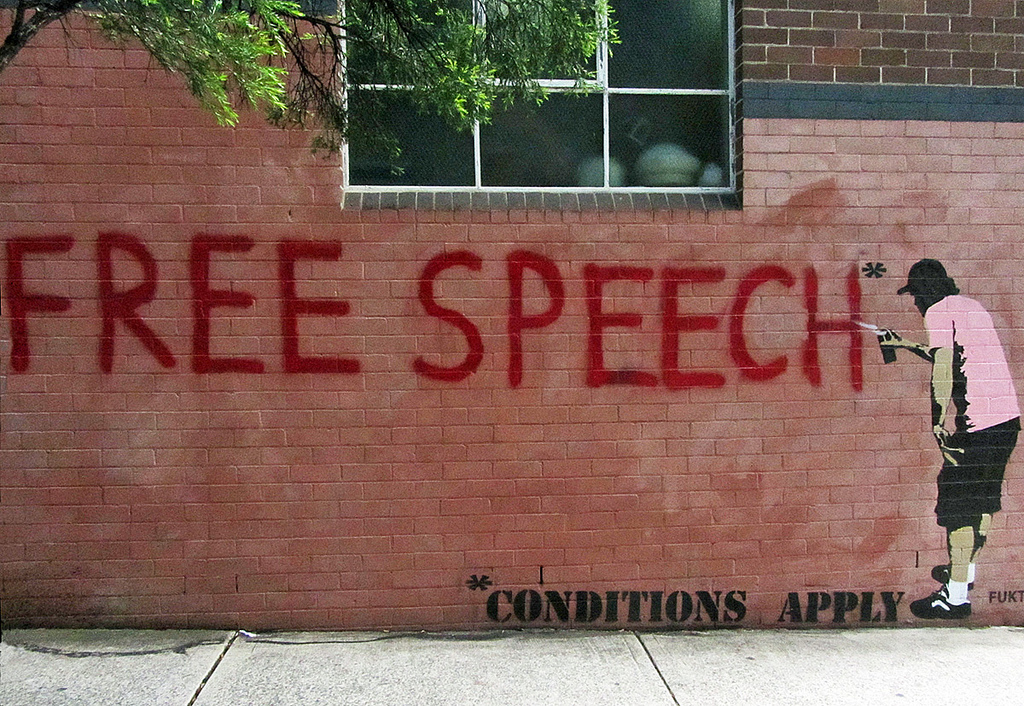Free Speech
Free Speech Doesn't Protect Nazis. It Protects Us From Nazis
Free speech advocates don’t defend the speech rights of Nazis because they believe that Nazis have anything valuable to contribute to a marketplace of ideas.

Free speech has recently become a cause célèbre of the nationalist and racist right-wing in the United States, as provocateurs like Milo Yiannopoulos bring their roadshows to college campuses, flout the values of progressive students, and then publicize and ridicule those students’ emotional or sometimes violent responses. As a result, some on the Left have become skeptical of the benefits of the First Amendment.
Prior to last year’s violent confrontation in Charlottesville, VA, during which an alt-right protester rammed his car into a crowd of counter-protesters, killing a woman and injuring others, the ACLU defended the right of neo-Nazis and white nationalists to demonstrate in support of Confederate monuments. For this, the ACLU was widely criticized by progressives, and since then, some progressives have begun to argue that a society with unfettered free speech is one that fails to protect marginalized communities.
Former ACLU legal director and Berkeley law professor john a. powell recently told a reporter from the New Yorker that absolutist free speech rules in the United States fail to weigh the value of speech against the harms that speech can cause, and argued that we ought to regulate speech that can cause P.T.S.D. and “stereotype threat.”
It is probably true that the value of some speech is less than the cost of the harm it imposes. But free speech advocates don’t defend the speech rights of Nazis because they believe that Nazis have anything valuable to contribute to a marketplace of ideas. They defend the rights of Nazis because Nazis with the freedom to speak can cause less harm than Nazis with the power to regulate speech.
Rights Are a Limitation on the Exercise of State Power
The United States Constitution gives the government a lot of power to regulate commerce, to declare war, to raise an army. And the first ten amendments to the Constitution set aside some individual rights that restrain the exercise of government power. The First Amendment protects speech, the press, religion, and assembly from government regulation or interference.
The document reflects the views of the framers, who had recently fought a bloody war to throw off the yoke of a monarch who claimed absolute authority by divine right, and they were deeply suspicious of state power. The US Supreme Court has interpreted the scope of First Amendment rights to be more far-reaching than similar rights in other Western countries and, as a result, the United States Congress can pass no restrictions on hate speech unless the Constitution is amended to rein in the scope of the First Amendment, or until the Supreme Court reinterprets the text in a way that narrows its protections.
In other words, narrowing the scope of free speech protections to accommodate limitations on hate speech, or to ban Nazis, or to shut Milo Yiannopoulos up, means reducing the scope of the individual right and expanding the power of the state to to regulate speech. In order to favor expanding the power of the state to regulate speech, you have to trust the state to wield that power judiciously, and not to abuse it or use it vindictively or excessively.
Before you empower government to police speech that is hateful or offensive, or speech that is deemed violent or harmful, then you have to consider the possibility that it will not be your sensibilities that determine which speech is beyond the pale.
University of Virginia law professor Frederick Schauer told the New York Times:
Because so many free-speech claims of the 1950s and 1960s involved anti-obscenity claims, or civil rights and anti-Vietnam War protests, it was easy for the Left to sympathize with the speakers or believe that speech in general was harmless. But the claim that speech was harmless or causally inert was never true, even if it has taken recent events to convince the Left of that. The question, then, is why the Left ever believed otherwise.
But, while the Left may have believed the speech subject to previous dispute was harmless, all of it was tested in litigation because somebody thought it was offensive and dangerous. And if not for a robust First Amendment, that speech might have been censored. The same rights that protect Milo Yiannopoulos today once sheltered abolitionists, civil rights marchers, anti-war demonstrators, and gay rights activists. Progressives have needed free speech in the past, and should consider the possibility that they might need it again before they throw their rights away.
We are living in a political moment when hateful individuals are emboldened to trumpet vile ideas in public, and can find a receptive audience for their message on social media. But we are also living in a moment in which the apparatus of state power is in the hands of a president who many people believe has authoritarian leanings.
President Trump has spoken admiringly of Phillipine leader Rodrigo Duterte, who operates death squads that summarily kill people the regime claims are drug dealers, and Trump has praised North Korean dictator Kim Jong Un who uses anti-aircraft guns to execute people who displease him. Trump routinely fumes on Twitter about “deep state” conspiracies to undermine him, and about the “fake news media” spreading lies about him. Many to the left of him believe the president poses an unprecedented challenge to the rule of law in the United States.
It is bizarre and misguided that people who profess to fear this president and the populist movement he leads favor reforms that would chip away at the protections that prevent Donald Trump from jailing or killing his critics. It may be true that strong individual rights prevent institutions from protecting marginalized people from the speech of other individuals, but strong individual rights also prevent the state from attacking marginalized people for exercising their own rights.
There is little in the history of the United States or any other country that should lead marginalized people to believe that they benefit from giving up individual rights or from expanding institutional power. Institutions can’t be trusted to protect marginalized people, and marginalized people must always be cautious that institutional power will be wielded against them. That’s what it means to be marginalized.

Progressives believe that the institutional powers that would regulate speech would do so in ways that reinforce their values. But there is no reason for progressives to believe this when Donald Trump is president. Trump speaks openly of his authoritarian aspirations and his power to realize them is only bounded by the limitations the law places on the power of institutions like the ones he controls.
Other Countries’ Hate Speech Laws Are Dangerous in the Wrong Hands
Berkeley professor powell asked The New Yorker: “If our speech laws looked more like Canada’s, would that be the end of democracy as we know it?”
In Canada, “advocating genocide” is punishable by up to five years in prison, it is criminal to incite hatred that leads to “a breach of the peace,” and “hate propaganda” may be confiscated by the government.
In December of 2016, a Drexel University professor named George Ciccariello-Maher tweeted: “All I want for Christmas is white genocide.” This was a reference to a neo-Nazi conspiracy theory that Jews are advocating for open borders and mass immigration in order to foment a genocide against whites, but lots of people didn’t get the joke, or didn’t think it was funny. After months of outrage directed at the university and death threats directed at Ciccariello-Maher, Drexel placed him on leave. He subsequently resigned, but found a new position as a visiting scholar at NYU.
If the US had Canada’s criminal law against “advocating genocide,” a Trump-aligned prosecutor could have put Ciccariello-Maher in prison.
Canada’s hate speech restrictions are actually pretty narrow; only a few progressives would get in trouble for “advocating genocide,” but Milo Yiannopoulos doesn’t advocate genocide either. His most offensive acts—ridiculing a transgender student at University of Wisconsin-Milwaukee and threatening to identify undocumented students at Berkeley—would be legal in Canada. Progressives would need a more robust set of hate speech prohibitions to get rid of controversial campus speakers like Milo.
In Germany, one is guilty of a crime if one “assaults the human dignity of others by insulting, maliciously maligning…a national, racial, religious group or a group defined by their ethnic origins.”
These laws were enacted explicitly to outlaw Nazis, but it would be incredibly easy to turn a rule like this against progressive activists. A majority of white Americans believe white people face discrimination in the United States, and many Republicans believe whites face more discrimination than any other group. A broader law criminalizing hateful speech creates a broader set of powers that the administration can use against those whose speech it finds hateful.
Imagine the Jeff Sessions Department of Justice turned loose on Twitter to go after progressive activists who have “assaulted the human dignity” of white people with insults. Imagine if local police could use such charges to go after Black Lives Matter activists. Empowered by a hate speech law like Germany’s, Trump could make federal criminal cases out of jokes, political rhetoric and academic critiques of whiteness.
It takes only a little foresight or imagination to see how speech codes intended to protect minorities could be used as instruments of persecution, or cudgels for an authoritarian regime to wield against its opponents. Free speech may have its drawbacks, but the alternative is much worse.
Free Speech Protects Everyone
Supreme Court Justice Louis Brandeis famously wrote that the remedy for speech used in service of “falsehoods and fallacies” is “more speech.” But even if you’re skeptical that bad speech is exposed in the “marketplace of ideas,” you have to admit that regulations on speech only work if you can trust the regulator. And right now, in the United States, the regulator is Donald J. Trump.
We must favor individual rights over institutional power, even when individuals do bad things with their rights, because institutional power is much more dangerous when it falls into the wrong hands. We protect and tolerate speech we don’t like, so that we can speak without fear that those who don’t like us will use coercive institutional force to silence us. We don’t let Nazis speak for their sake; we let them speak for ours.






